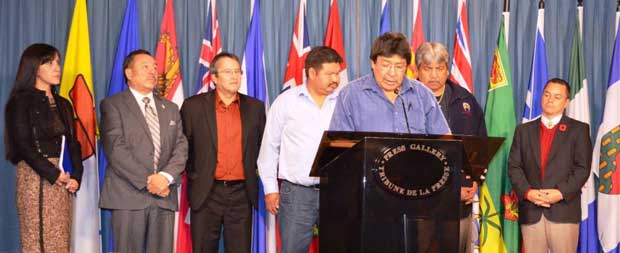
THUNDER BAY – Chief Roger Wesley of Constance Lake First Nation took aim at the Federal Government today saying Minister Clement’s comments in Thunder Bay this week signal a new and unfortunate turn in the Government’s relationship with First Nation Peoples.
“I am worried, but also saddened,” said Wesley, referring to the FedNor Minister’s comment during a visit to Thunder Bay, that a Joint Review Panel Environmental Assessment (EA), like the one that First Nations and Municipalities in the region have been calling for in the Ring of Fire, would only bring up “irrelevant issues.”
“A Joint Review Panel EA would give time for appropriate consultation and a serious look at the impacts on the land, but also on our people. Impacts to our culture, our communities, our land and way of life are not irrelevant!” said Chief Wesley.
Minister Clement was in Thunder Bay on June 4th and gave a speech at Coastal Steel.
Referring to the comment by Clement that First Nations have no “veto” Chief Wesley said, “The Government’s duty is not only to consult First Nations, but also to accommodate First Nations. The Minister should read the Canadian Constitution Act, 1982 (sec.35).
And as far as First Nations not having a veto, legal precedents have already been set in this country that indicate the government must seek First Nation CONSENT if there is the possibility of serious negative impact from development on our traditional lands. They clearly do not respect their own constitution. It is a sad and frightening day when the Canadian government makes such outrageous comments.”
“When a federal minister states publicly that First Nation concerns are irrelevant, everyone in this country should be worried. Today it our rights, tomorrow it could be yours. Don’t get in the way of the Government’s resource development expansion or your rights will be deemed irrelevant,” said Chief Sonny Gagnon of Aroland First Nation.
“Furthermore the Government is using some pretty creative accounting procedures if they believe they have provided our First Nations with the finances to respond to the Ring of Fire developments.
Tony Clement has just set our Treaty Relationship back 100 years to the time when railway expansion led to the displacement and brutal mistreatment of our people, leaving a legacy of suffering.”
Chief Peter Moonias of Neskantaga First Nation who recently stated, “They will have to kill me first,” when referring to a road being built over the Attawapiskat River, reiterated his comments and said, “Minister Clement chooses to minimize what I have said. I am not threatening to walk away from the table as he suggests, I am planning to prevent a road from being built over the Attawapiskat River unless we get the proper, negotiated Joint Review Panel EA process. The Minister underestimates our connection to our land and he underestimates our determination.”
In reference to Minister Clement’s comments that it would be inexcusable to wait a decade to get the Ring of Fire projects going, Chief Eli Moonias of Marten Falls said. “His comments are inexcusable when referring to a very potentially destructive mega-project, and as arrogant an attitude that a Federal Government with a majority can have. These comments are usually made at the expense of a First Nations lobby. I think what is happening at the Athabasca tar sands is inexcusable. If a delay had taken place there in order to ensure proper environmental controls then the water there might still drinkable and the fish would still look normal”.
“As it is there is now arsenic and mercury in that once pristine river. That river was destroyed with a short fast-track Environmental Assessment process like the Comprehensive Study EA that Canada is using for the Cliffs Chromite project. Now they want to stream-line the process further with new legislation. Is there something wrong with the government’s thought process if not their mental capacity? I find it all INEXCUSABLE!” Chief Eli Moonias stated.
Backgrounder – About the Ring of Fire: The Ring of Fire is an area exceedingly rich in minerals and precious metals. It is situated in First Nations Traditional Territories around McFaulds Lake in Northern Ontario. Resource developments in the area has the potential to drive the Ontario and Canadian economies for decades.
Several First Nations will be impacted by development in the area or by the associated infrastructure. Over 100 bodies of water and four major rivers in the James Bay Lowlands will be affected. The James Bay Lowlands contain the largest collection of intact wetlands in the world and sequester 25 years of the world’s carbon emissions. The Lowlands are part of the Boreal Forest, the last and largest intact forest ecosystem in the world. If the world had to find another way to filter its air, it would cost 750 billion dollars a year.
In November 2011, First Nations in the region launched a Judicial Review of the decision by the Canadian Environmental Assessment Agency to use a one-year, mostly paper driven environmental assessment process for the Cliffs Chromite project in the Ring of Fire.
The First Nations are not opposed to development. However the development must be sustainable, responsible and undergo an appropriate environmental assessment.
Backgrounder: Constitution of Canada:
PART II: RIGHTS OF THE ABORIGINAL PEOPLES OF CANADA
Recognition of existing aboriginal and treaty rights
35. (1) The existing aboriginal and treaty rights of the aboriginal peoples of Canada are hereby recognized and affirmed.
Definition of “aboriginal peoples of Canada”
(2) In this Act, “aboriginal peoples of Canada” includes the Indian, Inuit and Métis peoples of Canada.
Land claims agreements
(3) For greater certainty, in subsection (1) “treaty rights” includes rights that now exist by way of land claims agreements or may be so acquired.
Aboriginal and treaty rights are guaranteed equally to both sexes
(4) Notwithstanding any other provision of this Act, the aboriginal and treaty rights referred to in subsection (1) are guaranteed equally to male and female persons.(96)
Commitment to participation in constitutional conference
35.1 The government of Canada and the provincial governments are committed to the principle that, before any amendment is made to Class 24 of section 91 of the “Constitution Act, 1867”, to section 25 of this Act or to this Part,
(a) a constitutional conference that includes in its agenda an item relating to the proposed amendment, composed of the Prime Minister of Canada and the first ministers of the provinces, will be convened by the Prime Minister of Canada; and
(b) the Prime Minister of Canada will invite representatives of the aboriginal peoples of Canada to participate in the discussions on that item.(97)




